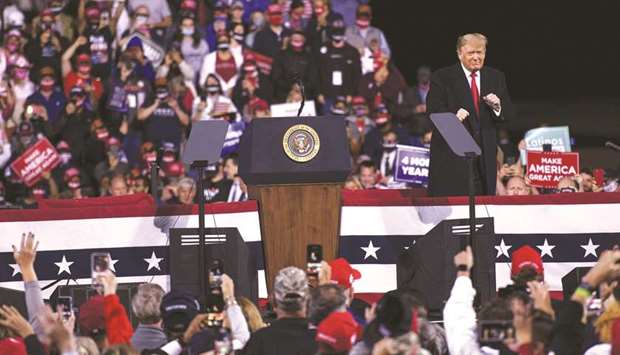A second Republican in Senate yesterday voiced objections to President Donald Trump’s plan to fill a vacancy on the Supreme Court weeks before an election that would cement a 6-3 conservative majority.
Hours before Trump’s rival in November, former vice president Joe Biden, was due to address the plan, senator Lisa Murkowski of Alaska said she did not support the move, becoming the second of the 53 Republicans in the 100-seat chamber to object publicly following the death of liberal Justice Ruth Bader Ginsburg on Friday.
Trump’s plan to quickly fill the vacancy drew immediate criticism from Democrats, who noted that in 2016 Republican Senate majority leader Mitch McConnell blocked a vote on a Democratic appointee, saying it was inappropriate to do so in an election year.
“I did not support taking up a nomination eight months before the 2016 election to fill the vacancy created by the passing of justice Scalia,” Murkowski said in a statement. “We are now even closer to the 2020 election – less than two months out – and I believe the same standard must apply.”
Senator Susan Collins of Maine voiced similar concerns on Saturday. Collins is locked in a tight re-election battle, while Murkowski’s current term extends two more years.
Justice Antonin Scalia, a close friend of Ginsburg’s, died in February 2016, but McConnell blocked a vote on Democratic president Barack Obama’s Supreme Court nominee, Merrick Garland.
Trump on Saturday said he will make his nomination this week and named Amy Coney Barrett of the Chicago-based 7th Circuit and Barbara Lagoa of the Atlanta-based 11th Circuit as possible candidates to fill the vacancy created by Friday’s death of liberal icon Ruth Bader Ginsburg.
The passing of Ginsburg upended the November election contests, energising both Trump’s conservative base – eager to see the court overturn the 1973 Roe v. Wade decision that legalised abortion nationwide – and presenting new complications in the battle for control of the US
Senate.
“I will be putting forth a nominee next week. It will be a woman,” Trump said at a campaign rally in Fayetteville, North Carolina, where supporters chanted “fill that seat.” “I think it should be a woman because I actually like women much more than men.”
Trump and McConnell have time to make the nomination and schedule a vote.
While elections are on November 3, a new Congress won’t be sworn in until January 3, with the winner of the presidential contest sworn in on January 20.
Republican senator John Barrasso on NBC’s Meet the Press yesterday brushed off Democratic complaints about the nomination process.
“Let’s be very clear – if the shoe were on the other foot and the Democrats had the White House and the Senate, they would right now be trying to confirm another member of the Supreme Court,” Barrasso said.
Democrat Hillary Clinton, whom Trump defeated in the 2016 election, on the same programme called that view “indefensible.”
“What’s happening in our country is incredibly dangerous,” said Clinton, a former secretary of state whose husband, Bill Clinton, nominated Ginsburg to the court in 1993. “Our institutions are being basically undermined by the lust for power.”
Trump has already appointed two justices: Neil Gorsuch in 2017 and Brett Kavanaugh in 2018.
Kavanaugh was narrowly confirmed after a heated confirmation process in which he angrily denied accusations by a California university professor, Christine Blasey Ford, that he had sexually assaulted her in 1982 when the two were high school students in Maryland.

President Donald Trump reacts after speaking during a Make America Great Again campaign rally in Fayetteville, North Carolina.
